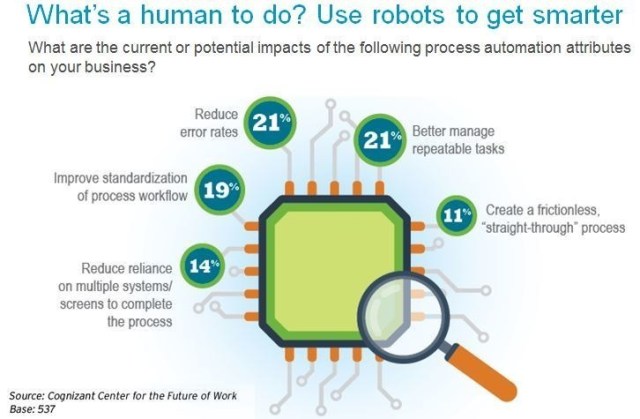Mar 27 2015
Senior executives across industries agree that new software "robots", leveraging attributes such as machine learning, artificial intelligence, and effective use of big data, will unlock significant value within the next three to five years, according to a new study released by Cognizant.
 A new study from Cognizant's Center for the Future of Work showed that business leaders across multiple industry sectors are using software robots not only to save costs, but increasingly to make their businesses smarter through intelligent process automation.
A new study from Cognizant's Center for the Future of Work showed that business leaders across multiple industry sectors are using software robots not only to save costs, but increasingly to make their businesses smarter through intelligent process automation.
The study, conducted by Cognizant's Center for the Future of Work, polled 537 senior business and technology decision-makers across multiple industry sectors, including financial services, insurance, healthcare, pharmaceutical, retail, hospitality, and technology. Respondents largely agreed that the benefits of intelligent process automation (IPA), and mining the resulting big data, can be characterized as providing money and meaning for their businesses -- faster processing with fewer errors, unlimited scalability, and lower cost of ownership, along with the ability to make more timely business decisions through automation-enabled analytics.
Executives surveyed consider their use of process automation to be high, but indicate they are still in early stages compared to the technology available. The study concludes there is a long tail of process systems yet to be automated, as machine learning and artificial intelligence enable a new generation of knowledge "robots" that can mimic human actions while interacting with multiple applications.
Key findings include:
- Respondents believe they are automating, on average, 25-40% of their workflow today. The survey indicates this automation is occurring with workflows that follow rote procedures and manual inputs, paving the way for next generation IPA technologies to drive greater cost savings and efficiency while driving richer business insights when applied to more complex workflows.
- About half of the respondents saw automation as significantly improving their business processes within three to five years. About 44% have similarly high expectations for business analytics.
- Nearly one-fifth reported achieving cost savings of greater than 15% from IPA over the past year.
- Health insurers emerged as industry trailblazers, pushing frontiers of cost reduction through automation of middle-office functions, such as claims coding and processing, with over one quarter seeing at least 15% cost savings year-over-year.
- In banking, nearly half of those surveyed reported at least 10% revenue growth driven by process-aligned analytics over the past year, and nearly three out of every four banks (73%) expect to see similar growth in the next three to five years.
"The future of process work includes connecting skilled people to increasingly powerful technologies such as autonomic computing -- including artificial intelligence, machine learning and deep learning -- that can increase savings, enhance insights, and accelerate business. This shift is playing out in just about every industry," said Gajen Kandiah, Executive Vice President, Business Process Services, Cognizant. "Our IPA practice applies digital transformation at the process level to help our customers benefit from automation. Our new study findings show that this trend will only accelerate over coming years as business leaders seek agility, better customer understanding, and cost savings."
"Businesses are taking a new approach to their organizational and business process models using automation as a key delivery model to digitize and analyze," said Charles Sutherland, Executive Vice President of Research at HfS Research who has been closely researching developments in technology and process automation. "By implementing software robots, service providers can ensure that work is done around the clock, eliminate human error, and ensure scalability as they save costs and drive revenue. Process automation also allows clients and service providers to share benefits including enhanced compliance, reduced risk and improved job satisfaction of staff."